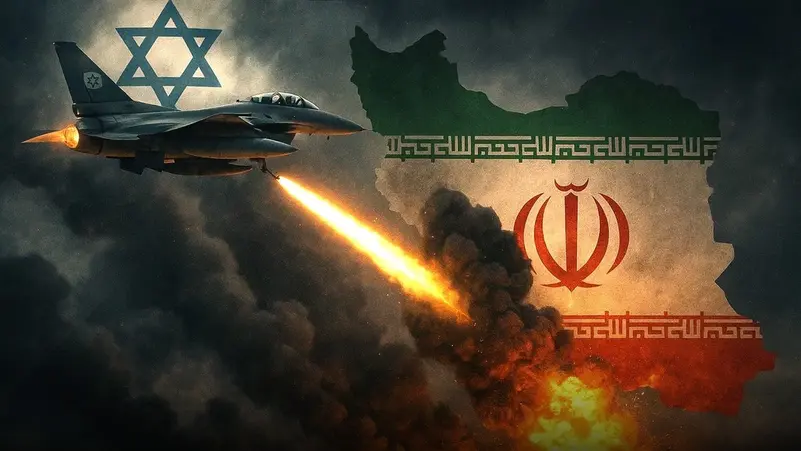In the early hours of Sunday, tensions between Iran and Israel escalated to an unprecedented level.
Iran launched a fresh wave of missile attacks targeting Israeli sites.
Resulting in casualties and widespread destruction.
In retaliation, Israel launched strikes on sensitive Iranian facilities.
This dangerous escalation raises serious fears of a broader regional war.
History of Conflict Between Iran and Israel
The conflict between Iran and Israel is one of the most complex and long-standing geopolitical rivalries in the Middle East.
It’s not a traditional territorial war but a deeply rooted ideological, political, and strategic conflict that has escalated over decades.
The modern tension began after the 1979 Iranian Islamic Revolution, when Iran’s monarchy (which had maintained good relations with Israel) was overthrown and replaced with the Islamic Republic led by Ayatollah Khomeini.
Iran’s new regime adopted a hardline anti-Israel stance, calling Israel a “Zionist regime” and vowing to oppose its existence.
Since then, the relationship has gone from cold hostility to open proxy conflict.
Main Reasons for Iran and Israel Conflict
1. Ideological Hostility
Iran’s Islamic regime views Israel as an illegitimate state and a colonial outpost in the Muslim world.
Moreover, Iran openly supports Palestinian resistance movements, particularly Hamas and Islamic Jihad, which are enemies of Israel.
Adding that Iranian leaders have repeatedly called for the end of the Israeli state — which Israel sees as an existential threat.
2. Nuclear Program
Israel strongly opposes Iran’s nuclear program, fearing it could lead to the development of nuclear weapons.
Iran insists its program is peaceful, but Israel (and many in the West) remain unconvinced.
This has led Israel to conduct cyber attacks, assassinations of Iranian nuclear scientists, and covert sabotage — which Iran has vowed to avenge.
3. Regional Influence (Proxy Wars)
Iran has built a network of proxy groups across the region: Hezbollah in Lebanon, militias in Iraq and Syria, and the Houthis in Yemen.
Many of these groups are armed, funded, and trained by Iran and have attacked Israel directly or threatened its borders.
Iran and Israel Escalation Over the Years
| Year | Event |
|---|---|
| 1979 | Iranian Revolution — diplomatic ties cut. |
| 1980s–2000s | Iran supports Hezbollah and Hamas; Israel conducts assassinations and covert ops. |
| 2006 | Israel-Hezbollah war — Iran backs Hezbollah heavily. |
| 2010–2020 | Cyber warfare begins (Stuxnet attack on Iran’s nuclear facilities); nuclear tensions rise. |
| 2020s | Abraham Accords (Israel-Arab normalization) increase Iran’s sense of isolation; covert war intensifies. |
| 2024–2025 | Open missile exchanges begin; Iran and Israel engage in direct attacks for the first time. |
Israeli Media: Over 240 Injuries in Bat Yam and Tel Aviv
According to Israeli media, the Iranian missile strikes killed 6 people and injured over 240 in the cities of Bat Yam and Tel Aviv.
The mayor of Bat Yam reported that more than 20 people remain trapped under the rubble of a residential building directly hit by an Iranian missile, while 61 other buildings sustained damage.
In response, the Israeli military announced airstrikes on Iranian nuclear facilities in the cities of Isfahan and Shiraz.
Israel also issued warnings urging Iranian civilians living near nuclear reactors to evacuate their homes immediately.

Iran’s “Crushing Response”: Hundreds of Missiles Launched
Over the past two days, Iran launched what it called a “crushing response,” firing hundreds of ballistic missiles toward Israel.
On Saturday, Israeli sources described what they called a “very serious incident” in Tel Aviv following the impact of one of Iran’s missiles.
Possible Worst-Case Scenarios if Iran and Israel Escalation Continue
1. Direct U.S. Involvement to Stop Iran and Israel War
Despite official denials, Iran clearly believes the U.S. either directly or tacitly supported Israeli attacks.
This could prompt Iran to strike American targets in the region — including military bases in Iraq, the Gulf, or U.S. embassies.
If an American citizen were killed in Tel Aviv or elsewhere, Washington — especially under Donald Trump — could be forced to take action, marking a catastrophic escalation.
2. Failure to Destroy Iran’s Nuclear Capabilities
If Israeli strikes fail to eliminate Iran’s nuclear infrastructure.
Especially deep underground sites like Fordow — Iran might accelerate its nuclear program, seeing it as the only deterrent against future attacks.
With over 400 kg of uranium enriched to 60% — just one step short of weapons-grade — Iran could potentially build up to 10 nuclear bombs.
Killing nuclear scientists doesn’t erase Iranian knowledge.
If newer, more aggressive commanders take control, this could lead to an irreversible escalation, locking the region in a cycle of strikes and counter-strikes — what Israeli strategists grimly call “mowing the grass.”
3. Global Economic Shock Due to Iran and Israel War
Oil prices are already on the rise.
If Iran attempts to close the Strait of Hormuz, global oil flow would be significantly restricted.
On the opposite side of the Arabian Peninsula, Yemen’s Houthis — Iran’s remaining active proxy — could intensify attacks on Red Sea shipping lanes.
This would worsen inflation in a global economy already under pressure from trade wars and cost-of-living crises.
The biggest winner in a spike in oil prices?
Vladimir Putin, whose war in Ukraine could be financed by surging oil revenues.
4. Collapse of the Iranian Regime
What if Israel succeeds in its long-standing goal of toppling Iran’s Islamic regime?
Although Netanyahu claims his main target is Iran’s nuclear program, his Friday speech revealed broader ambitions, telling the “proud Iranian people” that the attack paves the way to freedom from their “evil, oppressive regime.”
While regime change may be welcomed by some, history shows that removing strong central governments — as seen in Iraq and Libya — often creates power vacuums and prolonged chaos.
A destabilized Iran could plunge into internal conflict with unpredictable consequences for the entire region.
What Comes Next? Will Iran and Israel Stop the War Soon?
As of now, the conflict remains between Iran and Israel.
Yet international organizations, including the UN, continue to call for restraint. But what if those appeals fall on deaf ears?
The coming days will be critical.
Everything may hinge on two questions:
- How will Iran respond?
- And to what extent can the United States restrain Israel?








